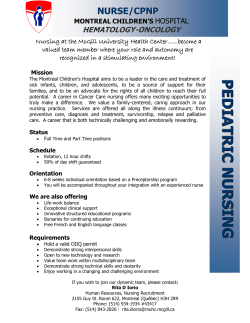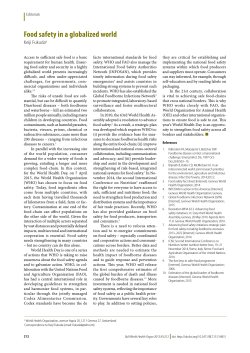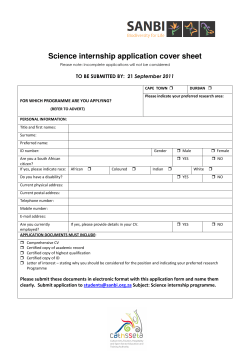
SAMPLE LETTER TO U.S. REPRESENTATIVE
SAMPLE LETTER TO U.S. REPRESENTATIVE Your Name Your Address DATE The Honorable (Name) U.S. House of Representatives (Address) Washington, DC 20515 This is to request that you cosponsor the Safe Food for Seniors Act of 2013, H.R. 2181, which ensures that Skilled Nursing Facilities (SNFs) receiving federal funds have a Director of Foodservice, if not a full-time Registered Dietitian, be trained as a Certified Dietary Manager/Certified Food Protection Professional (CDM/CFPP), a Dietetic Technician, Registered (DTR), or have the equivalent training from military experience or traditional education. H.R. 2181 accomplishes its purpose at no extra cost to the U.S. Treasury while bolstering a workforce training program for a growing sector of the economy. The Association of Nutrition & Foodservice Professionals (ANFP, formerly DMA) has nearly 15,000 members nationwide, 85% of whom work in long-term care facilities or hospitals. ANFP members who reside in your district have participated in a rigorous training and certification program offered by the Certifying Board for Dietary Managers. A Certified Dietary Manager is responsible for the day-to-day management of foodservice operations, including the implementation of quality nutritional care and sound food safety practices, With recent and proposed changes in healthcare delivery systems, we consider this certification vital to ensuring healthy and safe nutrition services for nursing home residents state-wide and in your district. Therefore, we urge you to cosponsor H.R. 2181 and look forward to working with you to protect our vulnerable senior population. Attached is a position paper from ANFP. If you have any questions, please do not hesitate to contact one of us and thanks for your support. Sincerely, Name Title encl. Safe Food for Seniors Act of 2013, H.R. 2181 Foodborne illness is a serious public health threat to Americans of all ages but seniors are often most at-risk. Approximately 76 million cases of foodborne illness occur every year in the United States, and of those, more than 325,000 people are hospitalized and about 5,000 deaths occur, according to the USDA and the Centers for Disease Control and Prevention (CDC). CDC’s Foodborne Disease Active Surveillance Network (www.cdc.gov/foodnet) states the fatalities “from foodborne illness among nursing home residents [are] 10 to 100 times greater than for the general population.” Seniors tend to be more susceptible to death and chronic long-term health effects from foodborne-induced gastroenteritis and more vulnerable to foodborne illnesses. Seniors’ immune systems are often impaired and their gastrointestinal tracts produce less stomach acid as they age, according to a study by J. L. Smith.1 Seniors are often on antibiotics that kill beneficial bacteria and that long term care facilities are confined environments where pathogens can spread easily.2 CDC suggests that not much has changed from the information generated in the seminal study in The Journal of The American Medical Association’s report entitled “Foodborne Disease Outbreaks in Nursing Homes, 1975 to 1987”3, Nursing home residents accounted for 2.4 percent of the food-borne illnesses in the United States during that period, but 19.4 percent of the deaths. A major contributing factor to foodborne illnesses among the elderly is that nursing home kitchens are inspected infrequently. The Centers for Medicare/Medicaid Services (CMS) confirms that it contracts with each state to conduct onsite inspections, including food storage and preparation, and that inspections occur “on average about once a year.”4 There are no minimum Federal training or certification qualifications for a director of food services. Specifically, the explanatory guidance set forth by the Department of Health and Human Services for the interpretation of the intent of 42 CFR 483.35 states that “[a] director of food services has no required minimum qualifications, but must be able to function collaboratively with a qualified dietitian in meeting the nutritional needs of the residents.” Because of the vulnerability of seniors to foodborne illness, it is imperative that foodservice operators be trained on critical food safety and sanitation issues. 1 out of every 3 nursing homes and long term care facilities have been documented for deficiencies in dietary sanitation. Only half of all nursing homes and long term care facilities have a single full-time kitchen staff member certified in safe food handling, preparation and sanitation. Only 21 states require certification from the Certifying Board for Dietary Managers. Solution: The Safe Food for Seniors Act of 2013 (H.R. 2181) will fill this void in CMS regulations to raise the standards of care for seniors by requiring Skilled Nursing Facilities (SNFs) receiving federal funds to require the Director of Foodservice, if not a full-time Registered Dietitian, be a Certified Dietary Manager/Certified Food Protection Professional (CDM/CFFP), Dietetic Technician, Registered, or have the equivalent training from military experience or traditional education. This would ensure that food service managers who run the day-to-day operations are adequately trained and certified. Status: Safe Food for Seniors had bipartisan support in the 111th and 112th Congresses, but was limited to just the CDM/CFFP training and certification program to meet requirements. The Safe Food for Seniors Act of 2013 (H.R. 2181) was introduced May 23, 2013 by Reps. Tom Latham (R-IA) and Earl Blumenauer (D-OR), and provides SNFs with a broader array of programs to meet training and certification requirements for their directors of food services. Congress must act to further protect the millions of seniors in nursing homes and long-term care facilities from foodborne illnesses and can do so at no cost to the government. This is also not a burden to the industry as a facility can train an existing foodservice employee at a nominal cost. Risks of foodborne illness among residents in nursing homes can be minimized through low cost, high impact training and certification. We owe it to our parents and to America’s elderly. ___________________________ 1 J. L. Smith, “Foodborne Illness in the Elderly”, Department of Microbial Food Safety, U.S. Dept. of Agriculture, note in Center for Food Safety and Applied Nutrition, U.S. Food and Drug Administration publication, “Seniors and Food Safety”, May 1999. . 2 “Protecting Residents from Foodborne Illnesses”, Jamie Stamey, RD, LDN, CFSP, Nursing Homes magazine, December 17, 2006. 3 Journal of the American Medical Association (JAMA) Authors Douglas Archer, Ph.D., deputy director of FDA's Center for Food Safety and Applied Nutrition, and William C. Levine, M.D., Joanne F. Smart, M.D., Nancy H. Bean, Ph.D., and Robert V. Tauxe, M.D., all of the national Centers for Disease Control in Atlanta, Ga. 4 Department of Health and Human Services, Medicare.gov, “About Nursing Home Inspections”. 3/2014
© Copyright 2025













